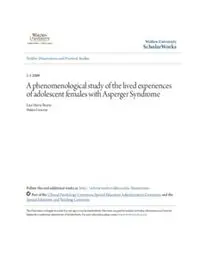
A phenomenological study of the lived experiences of adolescent females with Asperger Syndrome PDF
Preview A phenomenological study of the lived experiences of adolescent females with Asperger Syndrome
Walden University ScholarWorks Walden Dissertations and Doctoral Studies Walden Dissertations and Doctoral Studies Collection 1-1-2009 A phenomenological study of the lived experiences of adolescent females with Asperger Syndrome Lisa Marie Beteta Walden University Follow this and additional works at: htps://scholarworks.waldenu.edu/dissertations Part of the Clinical Psychology Commons, Special Education Administration Commons, and the Special Education and Teaching Commons Tis Dissertation is brought to you for free and open access by the Walden Dissertations and Doctoral Studies Collection at ScholarWorks. It has been accepted for inclusion in Walden Dissertations and Doctoral Studies by an authorized administrator of ScholarWorks. For more information, please contact Walden University COLLEGE OF EDUCATION This is to certify that the dissertation by Lisa Marie Beteta has been found to be complete and satisfactory in all respects, and that any and all revisions required by the review committee have been made. Review Committee Dr. Peggy Locke, Committee Chairperson, Education Faculty Dr. Douglas Eicher, Committee Member, Education Faculty Dr. Cheryl Bullock, Committee Member, Education Faculty Chief Academic Officer Denise DeZolt, Ph.D. Walden University 2008 ABSTRACT A Phenomenological Study of the Lived Experiences of Adolescent Females with Asperger Syndrome by Lisa Marie Beteta A Phenomenological Study of the Lived Experiences of Adolescent Females with Asperger Syndrome Dissertation Submitted in Partial Fulfillment of the Requirements for the Degree of Doctor of Philosophy Special Education Walden University December 2008 ABSTRACT Minimal research focuses on females with Asperger Syndrome (AS). Without understanding the experiences of this population, the knowledge and understanding necessary for the development of appropriate diagnosis and supports is unavailable. The purpose of this phenomenological study was to gain insights into the challenges faced by females with AS by describing the central phenomena of their lived experiences from a critical feminist theoretical framework. Four participants were included in the study that explored their lived experiences pertaining to academic, home, personal, and social experiences including their recollections pertaining to these social contexts during elementary, middle, and high school. Data was collected through semi-structured, in- depth interviews, observations, and artifacts. Data were examined for significant statements that aligned to the research focus, and these were then coded into four significant thematic units to inform textual description and synthesis of shared experience. Four significant units emerged including victimization, anxiety, social issues, and age-appropriate interests. The essential conclusion was that female adolescents with AS share common interests, though qualitatively different, with neurotypical peers while continuing to battle internal and external circumstances. Analysis of nonconforming information pointed to the utility of other theoretical models in understanding the AS experience of young females. This research contributes to positive social change by providing a voice to females with AS, lessening their invisibility as a minority within a minority. Contributing such knowledge of the lived experiences of female adolescents with AS can lead to the development of better diagnostic criteria and appropriate supports. A Phenomenological Study on the Lived Experiences of Adolescent Females with Asperger Syndrome by Lisa Marie Beteta M.S. Ed., Southern Oregon University, 2002 B.A., California State University, Fullerton, 1988 Dissertation Submitted in Partial Fulfillment of the Requirements for the Degree of Doctor of Philosophy Special Education Walden University December 2008 Copyright 200 by %HWHWD/LVD0DULH All rights reserved 2008 DEDICATION This dissertation is dedicated to my family. Justin Michael (1993-1999), you taught me so much in such little time. I love you, miss you, and will be with you again. Darcy, without you, I may not have ever known about Asperger Syndrome. You have taught me about the world and about myself as we journey through this adventure. Michael, without your tremendous support, everyone would have suffered. Thank you for cooking dinners, doing the grocery shopping, running the house, putting up with my quirks, and telling me, “you can do it!” You will now have your wife back. To Cyanna and Greyland, and my parents, Joe and Virginia Beteta, thank you for your patience and enduring the time it has taken me away from you. ACKNOWLEDGMENTS I want to thank my dissertation committee including Dr. Cheryl Bullock, and Dr. Doug Eicher, and especially Dr. Peggy Locke. Thank you, Peggy, for making me a better writer, for expanding my thoughts, and especially for challenging me. You have been the one that has made me grow in more ways than you realize. To Midge, Blanche, Tawnya, Betty, and Carolyn. Thank you for making work in special education exciting and fun. I have learned from each of you. I look forward to continued endeavors, as well. ii TABLE OF CONTENTS LIST OF TABLES ............................................................................................................. vi CHAPTER 1: INTRODUCTION TO THE STUDY ...........................................................1 Introduction ....................................................................................................................1 Background of the Problem ...........................................................................................3 Problem Statement .........................................................................................................6 Statement of Purpose .....................................................................................................7 Research Questions ........................................................................................................7 Phenomenology..............................................................................................................8 Conceptual Framework ..................................................................................................8 Definition of Terms........................................................................................................9 Assumptions .................................................................................................................13 Scope .........................................................................................................................13 Limitations ...................................................................................................................13 Delimitations ................................................................................................................13 Significance of the Study .............................................................................................14 Implications for Social Change ....................................................................................14 Summary ......................................................................................................................15 CHAPTER 2: LITERATURE REVIEW ...........................................................................17 Introduction ..................................................................................................................17 Research Strategy.........................................................................................................17 Asperger Syndrome .....................................................................................................18 Educational Services and Placement ...........................................................................23 Legal Implications .......................................................................................................25 Difference or Disability ...............................................................................................26 Sex Differences ............................................................................................................27 Lived Experiences of Individuals with Asperger Syndrome .......................................29 EMB Theory ................................................................................................................30 Sex Differences in Asperger Syndrome .......................................................................34 Females and Asperger Syndrome ................................................................................35 Adolescent Females .....................................................................................................40 Diagnosis and Gender ..................................................................................................41 Characteristics of Girls with Asperger Syndrome .......................................................43 Summary ......................................................................................................................46 CHAPTER 3: METHODOLOGY .....................................................................................48 Introduction ..................................................................................................................48 Research Questions ......................................................................................................48 Research Design...........................................................................................................49 Ethical Issues ...............................................................................................................51 Confidentiality .............................................................................................................52 iii
